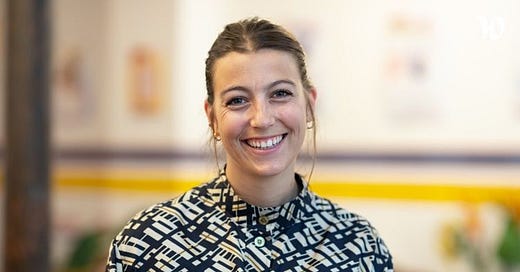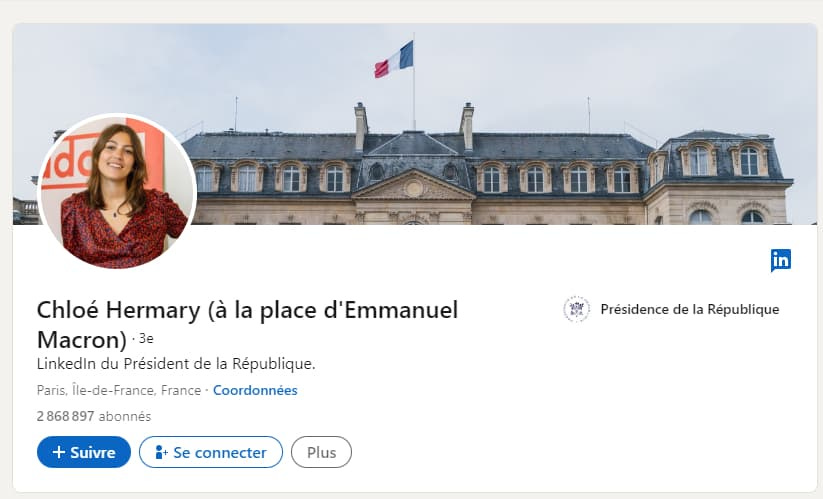‘We are actively challenging biases associated with the digital realm. The narrative that coding is exclusively a masculine domain emerged predominantly in the 1980s.’
Interview with Chloé Hermary, co-founder of Ada TechSchool
For this new edition of Beyond Impact, we welcome Chloé Hermary, co-founder and CEO of Ada Tech School, an inclusive coding school. You might know her since she hacked Emmanuel Macron’s LinkedIn profile on march 8th with SISTA :-).
She founded Ada Tech School with one very clear mission: transform the education path to avoid the waste of seeing people stuck in jobs that do not fulfill them. And it goes through rethinking the way coding is taught at school and considered and managed in companies.
What prompted you to start Ada Tech School?
The idea of Ada Tech School came to me in 2018, inspired by my academic journey in business school and my immersion in the world of impact entrepreneurship. I felt that it was a waste - both economically and socially - to witness individuals stuck in jobs that didn't fulfil them. This spurred my first entrepreneurial project, focusing on career guidance for young people. Through this journey, I realised that the real challenge lies within the educational system itself: the learning methods, the skills being acquired, and the learning environment being created. This led to the inception of Ada Tech School in 2019, with a mission to bridge the gap between the new generation’s work values, their unique way of learning and the evolving job market.
How would you define the specifics of learning at Ada Tech School?
We have developed our pedagogy on several core pillars. The first is creating a "safe space" that fosters learners’ confidence and validates their sense of belonging. We also believe in individualising progression; each person's learning path being unique. Lastly, we strive to dismantle the barrier between education and the job market by integrating the professional realm deeply within our school. This encompasses receiving training from industry experts and equipping students with essential career development skills. We firmly believe that tech skills extend beyond coding alone and encompass vital socio-professional competencies, such as effective communication and meaningful interaction with companies.
You speak of inclusion and diversity, what biases do you combat with this approach?
We are actively challenging biases associated with the digital realm. The narrative that coding is exclusively a masculine domain emerged predominantly in the 1980s. Prior to that, coding jobs were primarily held by women and resembled secretarial positions. However, as information technology gained economic and social significance, it acquired a masculine image. At Ada Tech School, our first action is to combat this perception and underscore that coding is a collaborative and creative endeavour suitable for individuals of all genders. This is why we named our school after Ada Lovelace, the first programmer in History, as we aim to reshape the narrative surrounding this industry. Another obstacle we face is promoting greater accessibility and establishing credibility in a field where women are frequently underrepresented. At Ada, we strive to create a secure and inclusive environment that fosters learners' self-assurance and gradually guides them into the professional realm. Ultimately, nothing validates an individual's abilities more than securing gainful employment.
How do you measure the impact of your training and this new way of teaching?
That's an interesting question. It's challenging to determine the social data we should measure upon entry and exit. Currently, 70% of our students are women, and 80% of our learners are registered as job seekers. Among them, approximately 15% to 20%, with variations among different promotions, receive full funding for their training. Around 30% of individuals come from priority neighbourhoods “Quartier Prioritaire de la Ville” (up to 60% in some of our batchs). Measuring social and professional backgrounds is a work in progress for us. For instance, we have people who were in the personal service sector - former nurses, daycare directors. We have people from artistic backgrounds, photographers, restaurant managers, refugees, and manual labourers. This wide range of academic and social experiences contributes to our impactful ecosystem. Notably, we have a 100% success rate in our final exam, which is at the bachelor's level. All our learners demonstrate growth at the end of the training, and within four months, 92% of them secure permanent developer jobs or pursue further studies at the master's level.
Do you think this know-how that you've built, which is now very much tied to digital, could be applied to other sectors?
I believe that this pedagogical perspective holds true universally, as all occupations are undergoing transformations, primarily due to digital technology and the influence of emerging organisational models. Our decision to focus on the digital sector is deliberate, as it presents vast opportunities. With groundbreaking innovations such as artificial intelligence, we are reshaping many new professions. Therefore, the ability to understand and master a domain that is seamlessly integrated into our everyday existence poses a significant challenge. Moreover, I firmly assert that Ada's pedagogy, characterised by hands-on learning and an emphasis on information research, is exceedingly relevant and valuable.
How do you have an impact beyond the Ada Tech School’s promotions? Do you think you can have a bigger influence through partnerships with corporates or connections with the public authorities?
We are currently collaborating with the government's digital department, which focuses on training computer science teachers. This effort is crucial because digital technology has been made optional in middle and high schools. Our aim is to address the significant challenge of shifting computer science education away from its heavily mathematical approach. Recently, I had a discussion with the High Council for Gender Equality regarding recommendations for promoting gender diversity in the tech industry. Observing our learners at Ada, it's truly remarkable to witness their discovery of a new world. We often refer to this initial phase as the "honeymoon phase." However, it is inevitably followed by a phase we call the "desert of despair." During this phase, individuals experience extreme disorientation as they realize that there is much more beyond the doors they initially opened. It's akin to placing someone on the Earth's surface and telling them, "This is geography." While not everyone needs to learn how to code, it is crucial to grasp the challenges posed by the digital environment and its influence. In my view, the primary challenge lies in fostering a collective understanding that is both accessible to the general public and widespread. Such an understanding would enable greater inclusion and diversity in the fields of coding and software development.





